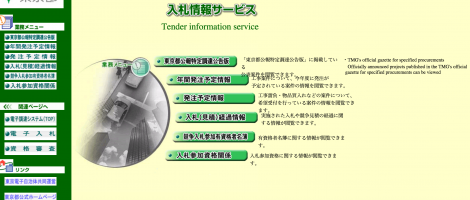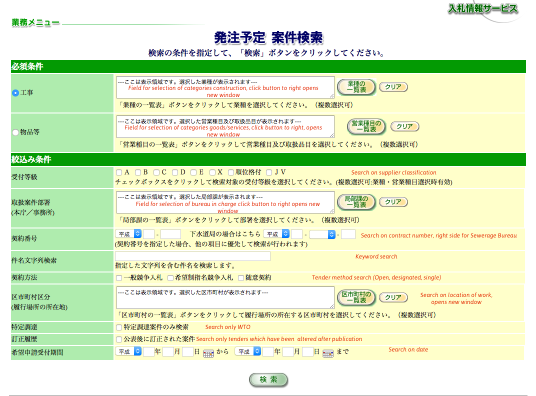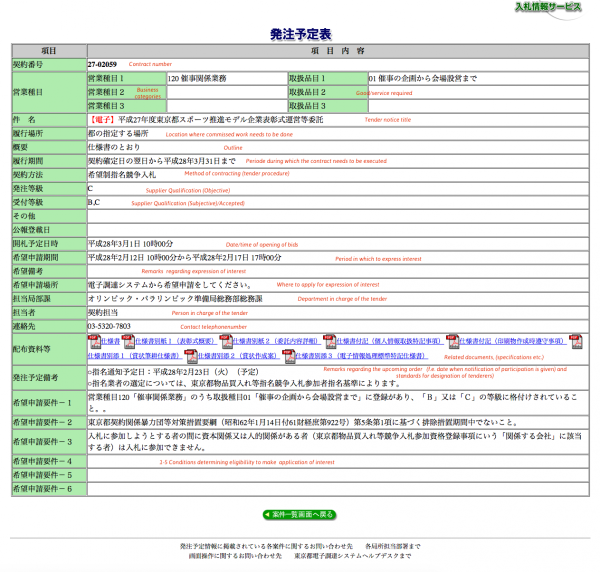
Tokyo Metropolitan Government Public Procurement

Tokyo Metropolitan Government (TMG) provides services to a population of almost 30 million inhabitants, which represents close to a quarter of the total population in Japan. The public procurement demand generated by this huge organisation is most likely similar to that of some mid-sized European countries. International interest in providing goods and services to TMG is on the rise recently, in particular due to the upcoming Tokyo 2020 Olympics. The public procurement system in Tokyo, is currently entirely in Japanese, with the exception of a list of WTO-tenders published by TMG’s Bureau of Finance. This page explains the following aspects of the tender procedures used in Tokyo.
- TMG and the Tokyo 2020 Olympics
- How to obtain supplier qualifications: goods and services
- How to obtain supplier qualifications: construction and design
- Main points of tendering process at TMG
TMG and the Tokyo 2020 Olympics
Preparations for the Tokyo 2020 Olympics are a joint responsibility for TMG and the Tokyo 2020 Organising Committee. TMG will be responsible for projects that will remain in place after the Games (“Legacy”) such as the construction of permanent facilities and construction of infrastructure. The Organising Committee will be responsible for core projects necessary to deliver the 2020 Games, including construction of temporary facilities. In terms of procurement therefore both organisations will conduct their public tenders according to their own procedures.
From April 2016, TMG will start with a tender portal with Tokyo 2020 related tender notices exclusively for SMEs. It is likely that these tenders wiil be conducted using existing procedures. At present, there are no plans known that TMG will publish Olympics related tenders notices (other than those under WTO) in languages other than Japanese.
Obtaining TMG Supplier Qualification: Goods and Services
- Validity: 2 years (present cycle until March 2017)
- Coverage:goods and services (For public works a separate system exists, see also)
- Scope: TMG bureaus, departments and affiliated organizations (Procurement by wards and cities within greater Tokyo are not included)
- Processing time: 3-5 days in case of digital application
- Bidding methods: Online, however bidders on WTO tenders can also place bids on paper
In order to participate in tender procedures with TMG, you will need to obtain supplier qualifications. Application is usually conducted online. However, in order to be able to complete the online application, it is necessary to obtain a digital ID first. The difficulty here is that a legal presence in Japan is required.
It is however possible to apply for supplier qualifications without having a legal presence in Japan, if you want to participate in a specific WTO tender. In this case, get in touch with TMG’s Finance Bureau, Accounting Division, 2nd Contracting Department, Qualification Assessment Section,
- by phone +81-353882632 or
- by sending an email to the email-address specified in the Summary Schedule of Procurements (WTO only).
(Please note that if you call them, they will most likely have difficulty dealing with you in English.)
TMG will then send this form (explanation) by email. After receipt of this form, TMG will make a ‘Digital Identification substitute file’ (“Key”). Using this Key, the necessary information can be entered into the online supplier qualification application system. On the basis of the information provided TMG will then assess and rank the applicant-company. Once the qualification is obtained, it is also possible to take place bids on paper in case of WTO tenders.
Documents required for supplier qualification application
- Financial statement (Balance sheet and P&L statement)
- Copy of company registration issued by appropriate authority
- Copies of licenses, quality assurance certificates
All documents issued in foreign languages need to have Japanese translations attached. Financial statements need to be recalculated into Japanese yen. Tokyo government does not have clear regulations with regards to recalculation into Japanese yen, so it is advisable to consult with them directly on this.
Assessment and classification/ranking of suppliers
On the basis of the information provided, TMG will calculate a so-called ‘objective score, with a maximum of 105 (in case of commissioned manufacturing) or 100 points (in case of sales of finished goods or services). The point-score is then used to attach a classification A,B or C.
Points | Classification |
> 70 | A |
>40-<70 | B |
<40 | C |
Beside the ‘objective score’ a ‘subjective score is also set for each individual tender contract. This score is determined on the basis of the suppliers’ annual turnover in one of seven specific business groupings. It is therefore possible that a supplier will get a different classification if annual sales for a particular product are lower/higher.
To make an assessment of the number of points and classification a company might get at TMG, use this calculator (Excel).
Ranking of suppliers within each class
TMG also ranks its suppliers within each class. This ranking is on the basis of the turnover for each product category. If the turnover is the same, other aspects are used. The ranking will then look as follows:
Business category Code XXX: |
Company I: Class A Rank 0001-00 |
Company II: Class A Rank 0001-50 |
Company III: Class A Rank 0002-00 |
Explanation: Company I and III applied for their qualifications during the official period of renewal. Company II applied in the intermediate period, and received the additional -50 ranking
Obtaining TMG Supplier Qualification: Construction/Design
Before applying for a supplier qualification to participate in public works’ construction and design tenders, prospective suppliers will need to obtain the following:
- Construction company permit
- Ministry of Land, Infrastructure, Transport and Tourism (MLIT) (English explanation)
- Tokyo Metropolitan Government (In Japanese)
- Contact: Bureau of Urban Development, Urban Construction Department, Construction Industry Section, TEL: 03(5321)1111 (Central number)
- Business Evaluation (keishin)
- MLIT (In Japanese)
- Tokyo Metropolitan Government
- Contact: Bureau of Urban Development, Urban Construction Department, Construction Industry Section, TEL: 03(5321)1111 (Central number)
Once these are obtained, a company can apply online with TMG for supplier qualification for participation in construction tenders. If a company has no legal presence in Japan and is not in the possession of a Digital ID, please contact the office where the application is made.
- Validity: Maximum of 2 years (present cycle until March 2017), however validity of keishin makes this period shorter to maximum of 1 year and 7 months
- Coverage:Construction, construction consulting services (design, survey work etc.)
- Scope: Separate applications need to be made at either one of the following:
- Bureau of Finance, , Accounting Division, 1st Contracting Department
- Bureau of Finance, , Accounting Division, 12nd Contracting Department
- Bureau of Waterworks
- Bureau of Transportation, Asset Management Department, Contracting Section
- Bureau of Sewerage
- Processing time: unknown
- Bidding methods: Online, however bidders on WTO tenders can also place bids on paper.
For more details about construction related qualification, contact us via our Ask-the-Expert service.
Tendering process at TMG: Main points
TMG's tender notice looks as follows (Click on image for explanation):

Goods and services
- With the exception of the English summary for WTO tender notices, the whole procedure is conducted in Japanese and Japanese yen;
- For contracts expected to be larger than ¥27 million (approx. €212,000) , suppliers are either decided in open competitive tenders under WTO rules;
- The tender procedures are conducted online, where the winner is chosen on the basis of the lowest price, as far as it is below a pre-determined ceiling price;
- Beside the lowest price, combinations of technical ability and price are also used to select the winning contractor;
- Price-negotiations are not possible.
Tender notice information page
TMG's tender notice information page looks as follows (Click on image for explanation):

Construction
- With the exception of the English summary for WTO tender notices, the whole procedure is conducted in Japanese and Japanese yen;
- For contracts expected to be larger than ¥500 million (approx. €3.9 mln) , suppliers are either decided in open competitive tenders or limited tenders;
- The tender procedures are conducted online, where the winner is chosen on the basis of the lowest price, as far as it is below a pre-determined ceiling price;
- Beside the lowest price, combinations of technical ability and price are also used to select the winning contractor;
- Price-negotiations are not possible;
- WTO tenders are usually published until 40 days in advanced, between publication of the notice and contracting are in general about 90 days;
- For non-WTO tenders the procedure is in general 30 days;
- In some instances of construction contracts, a 10% contract deposit is required from the winning contractor, which is repaid after completion of the project;
- Only in very small construction projects, a construction company permit might not be required. Small means here projects with a contract price of less than ¥15 mln (€118.000) or construction of wooden structures with a surface of less than 150 m2, or other construction projects with a projected contract value of ¥5 mln (€40,000).
Sources: TMG Presentation to EU member state trade counsellor’s (January 20th, 2016); TMG, 東京都物品買入れ等競争入札参加資格。平静27年度用 臨時受付申請の手引 (Tokyo Metropolitan open tender participation qualification for sales and purchase of goods etc. Guidelines for extraordinary application 2016)








